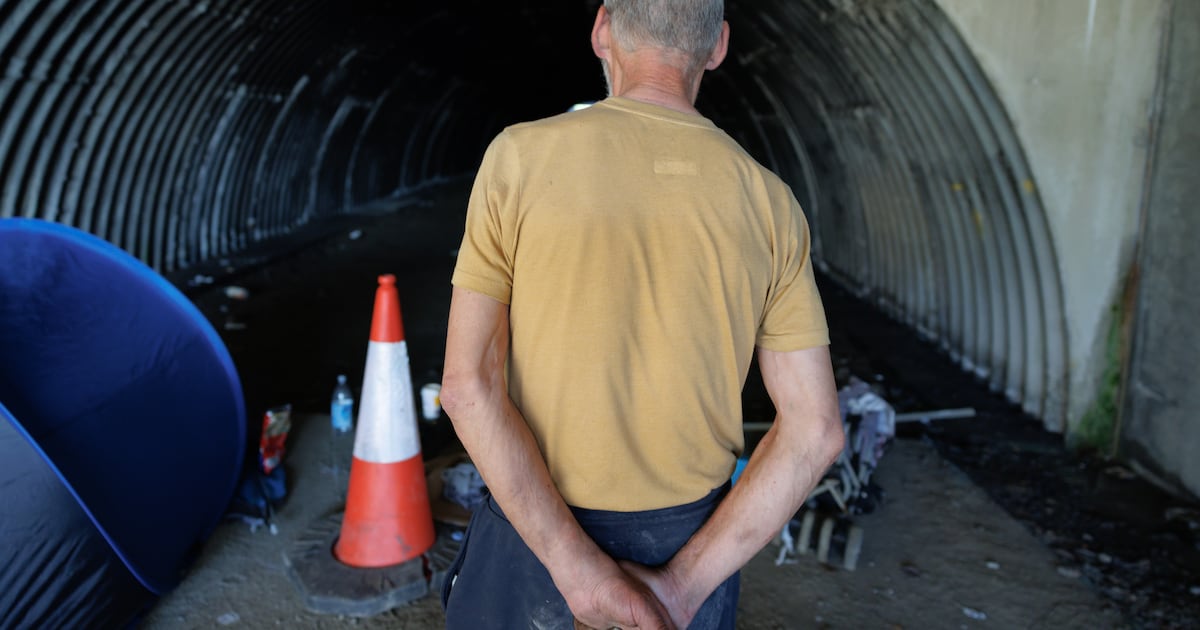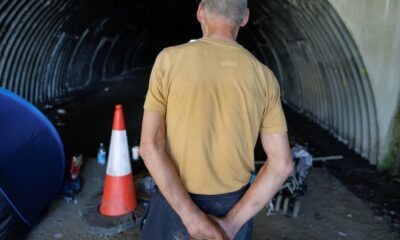Breaking News
Four rescued after fishing boat sinks off Donegal coast

Read more on post.
Four people have been rescued after a fishing boat sank off the coast of Donegal.
The incident happened in the early hours of Thursday morning off Bloody Foreland near Magheraroarty.
A distress call was sent out from the vessel and was picked up by the Maritime Rescue Sub Centre in Malin.
A number of emergency service units including the Rescue 118 helicopter, Bunbeg Coast Guard Unit and the Arranmore lifeboat responded.
However, all four fishermen who were on board the boat were taken to safety by a passing vessel and returned to Magheraroarty Pier.
A spokesperson for the Irish Coastguard said: “Just after midnight on Thursday 25th September the Maritime Rescue Sub Centre Malin was alerted to a fishing vessel sinking to the east of Bloody Foreland.”
Separately, a search for another fisherman was under way in Co Sligo on Friday.
It is believed he fell overboard from his vessel, and the Coast Guard is now focusing its operation on the area off Mullaghmore and out into Donegal Bay. Malin Head Coast Guard are co-ordinating the search.
A member of the public alerted the Coast Guard’s co-ordination centre of a fishing vessel that had run aground two nautical miles south of Mullaghmore Head.
The Sligo-based Coast Guard helicopter R118, Killybegs Coast Guard Unit and RNLI lifeboats from Bundoran, Aranmore, Ballyglass and Sligo are continuing to search the area with a number of local fishing vessels assisting.
Councillor Dónal Gilroy, Cathaoirleach of Sligo County Council, said the fisherman’s boat was found near Cliffoney beach at the western side of Mullaghmore Head.
Mr Gilroy said local people are thinking of the man’s family today as the situation unfolds.
“People go for walks along the seashore and along the cliffs, they will keep an eye out. Everybody is just that bit more observant, to try and help get the man back to us,” he said.
Breaking News
Homeless figure climbs to new record high of more than 16,300 people

Read more on post .
The number of homeless people in the State has climbed to another record high, now standing at more than 16,300, including more than 5,100 children.
The latest data, published on Friday by the Department of Housing, shows there were 11,208 adults and 5,145 children in homeless accommodation during the week of August 25th-31st.
These children were included in the 2,391 families registered as homeless last month.
The figures do not include rough-sleepers, those in domestic violence refuges, or the “hidden homeless” such as those sofa surfing.
The figures represent an increase of 295 people since July, when 16,058, including 5,014 children, were homeless.
In August 2024 there were 14,760 people, including 4,561 children, listed as homeless. The latest figure represents an increase of 1,593 homeless people in a single year.
In Dublin 11,782 people, including 3,813 children, were counted as homeless last month – up from 11,567 people including 3,719 children in July 2025.
The figures for last month show that Irish-born people account for just over half (51 per cent) of all homeless adults, with the rest coming from either the EU or the UK (20 per cent) or farther afield (29 per cent).
Some 252 people living in emergency accommodation last month (2 per cent) were over 65 years of age, while 53 per cent (5,956) were aged 25-44.
A further 3,050 were aged 45-64 while 1,950 were aged 18-24.
Most homeless adults (60 per cent) were men.
The number of homeless single adults stands at 7,170, of whom 4,971 are in Dublin.
Catherine Kenny, chief executive of Dublin Simon Community, said it was not too late for those in power to take “decisive action” on the issue.
“Once again, we are witnessing record-shattering homeless figures. Tragically, we are at a stage where we have come to expect these increases,” she said.
Ms Kenny said Budget 2026 must include a clear, cross-departmental plan to tackle homelessness as a “housing, health and social emergency”.
“This cannot be solved in one year – what we expect is the start of sustained investment over the coming years. We cannot expect different results if we continue acting the same way, with housing, health, and social departments working in silos,” she said.
“We can no longer accept seeing the homeless figures climb upward every month. This has been a crisis for some time and it needs to be treated as the emergency it is.”
[ Children have ‘borne the biggest brunt’ of homelessness crisisOpens in new window ]
Pat Dennigan, chief executive of Focus Ireland, said the upcoming Government plan on housing and homelessness, due to be published in October, must be a “turning point.”
“We need more than modest adjustments – it must deliver a bold and transformative shift in housing and homelessness policy.
“The scale of the crisis demands a strategy that is ambitious, targeted, and capable of delivering real impact for the thousands of people currently without a home, and in particular the 5,145 children who are growing up in emergency accommodation,” he said.
Social Democrats TD and housing spokesperson Rory Hearne described the latest figures as “another shameful milestone”.
He noted that the figures showed 1,559 families with 3,273 children had spent longer than six months in emergency accommodation, a 246 per cent increase since 2022.
“The legacy of successive Fianna Fáil and Fine Gael governments is one of complete failures to prioritise ending homelessness.
“The Coalition has failed to protect families and children from evictions and skyrocketing rents, to deliver sufficient social and affordable housing, and to invest in prevention,” he said.
Breaking News
Watch: Officials walk out as Netanyahu addresses UN

Read more on post.
Scores of delegates exited the hall of the United Nations General Assembly as Israeli Prime Minister Benjamin Netanyahu walked up to the podium to give his speech.
Israel’s military response has killed more than 65,000 people in Gaza, according to local health officials, and left much of the territory in ruins.
In an upsurge of diplomacy, there is renewed pressure to end the almost two-year war in Gaza.
This week, in an effort to put pressure on Israel to end the war, ten countries formally recognised the state of Palestine.
Breaking News
What is a digital ID card, will it be mandatory and will it be safe?

Read more on post .
Digital ID will be rolled out across the UK as part of the government’s attempts to tackle illegal working.
But how will it work? Will everyone be legally required to have it? What if you don’t have a smartphone? How does it work in other countries?
We answer all those questions, and more.
Politics latest: Starmer says UK at ‘crossroads’
What details will be on the ID cards?
They will include name, date of birth, a photo, nationality and residency status. A consultation will determine if addresses will be included.
Will digital ID be mandatory?
Yes. All UK citizens will have to have a digital ID, Culture Secretary Lisa Nandy told Sky News.
However, she said it is “entirely their choice” if people want to use them.
The government said people will not be required to carry their ID – although it will be in phones, so people likely will – and they will not be asked to produce it.
The current method of providing a physical driving licence, passport, national insurance, bank statements and utility bills to prove your identity will still be available to use.
How will digital ID be stored and how will you show it?
Earlier this year, the government announced it would launch a gov.uk wallet as part of the gov.uk app launched this summer.
This will look like the ‘wallets’ people can access on their smartphones, such as Apple Wallet and Google Wallet, where contactless bank cards, tickets and loyalty cards are stored and can be used from.
A person’s ID ‘card’ will be stored in the digital wallet, alongside a digital driver’s licence and an Armed Forces Veteran Card, which will launch later this year.
Only government documents will be able to be stored in the gov.uk wallet, and they will not be available through other ‘wallets’.
People will be able to digitally pull up the cards on their phone to display them.
What if you don’t have a smartphone, or don’t want to store ID on your phone?
The government has said people who do not operate digitally, or want to carry a digital ID, will be given a physical card, which will be free.
Read more: The pros and cons of digital IDs – and do we need them?
What will you be able to use digital ID for?
Anything requiring an identity check, ranging from buying alcohol to applying for government services such as driving licences, childcare and welfare.
How will it change employment checks?
For people who are not British citizens, it will be mandatory to show their digital ID to potential employers so they can see their immigration status.
The government said this is the main reason for introducing digital ID as they try to stop one of the key “pull factors” for people to come to the UK illegally.
British citizens will be able to show the digital ID, or their passports, to employers to prove their right to work, a check introduced in 1996.
When will it be rolled out?
The government said digital ID will be available by the end of this parliament, which is set for 2029.
A consultation will first take place to determine how it would work for groups who may not use phones or have difficulty doing so, including older people, homeless people and those with disabilities.
How about cybersecurity concerns?
The government said it will use “state-of-the-art” encryption and authentication technology it already uses to protect digital transactions.
If a phone is stolen or lost, the digital credentials on it can be revoked and reissued straight away.
Ministers said they expect this to provide better security than traditional physical documents.
Will MPs and Lords have to pass legislation?
It seems not.
Culture Secretary Lisa Nandy suggested it would not have to go through the House of Commons or House of Lords and will be pushed through by the government.
When asked if it would have to go before parliament or would just take place, Ms Nandy said: “This is being done.”
-
Politics3 days ago
European Parliament snubs Orbán with vote to shield Italian MEP from Hungarian arrest
-
Culture3 weeks ago
Life, loss, fame & family – the IFI Documentary Festival in focus
-
Health4 days ago
EU renews support for WHO’s Universal Health Coverage Partnership
-
Environment7 days ago
Key oceans treaty crosses threshold to come into force
-
Culture2 months ago
Fatal, flashy and indecent – the movies of Adrian Lyne revisited
-
Culture3 days ago
Twilight at 20: the many afterlives of Stephenie Meyer’s vampires
-
Culture1 week ago
Farewell, Sundance – how Robert Redford changed cinema forever
-
Culture3 weeks ago
What is KPop Demon Hunters, and why is everyone talking about it?















































